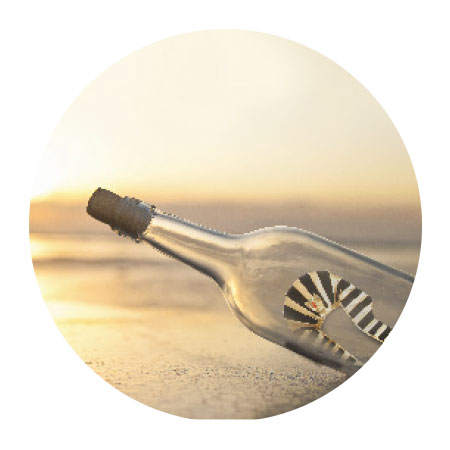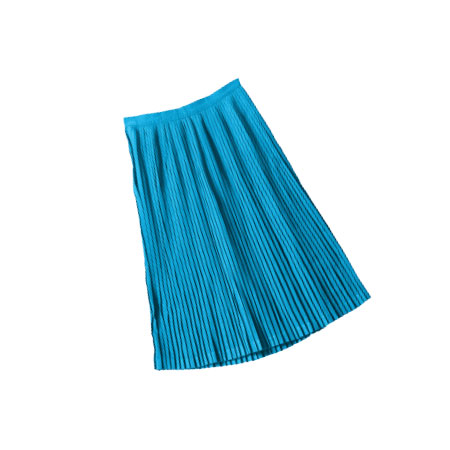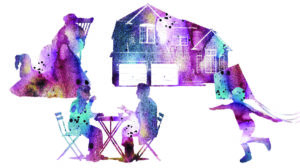My Corona Time Capsule
| June 24, 2020Endless days blurred into months of upheaval. We strove to forge forward. Twenty-one readers reveal the single object that defined the tenor of these times

Pharaoh Costume

COVID. My father-in-law had passed away. We had thought he was going home. Hashem had other plans.
Everything stopped and everything started spinning all at once. A call to our posek and suddenly my husband was sitting shivah on the floor, out of commission. I had minutes left to get rid of the chometz, tape everything up, and cook. Unable to think, I still flew into action.
Amid all the cooking, baths, and Yom Tov prep, there was a levayah too, over Zoom. So surreal. It highlighted the bizarre times we were living through.
Somehow, we made it through and arrived at candle lighting. The kids were ready with smiles and the tables set. How, I’ll never know. But seeing my husband, now an avel without his kittel at the Seder, left a raw hole in our new reality.
We started the Seder. When we reached Maggid, my husband disappeared. A few minutes later he came back, dressed head-to-toe as Pharaoh.
Suddenly, the entire atmosphere changed. The kids started giggling, then broke into full laughter as my husband proceeded to dance around the room with them, run through the Yam Suf, and sing, pure joy on his face. You’d never would have known what had taken place only 12 hours earlier.
It was then I knew we were going to be okay, that just like Hashem saved us from Pharaoh all those years ago, He will save us from this as well. Because in that costume, I saw our nation’s resilience.
— Sarah Schwartz, Las Vegas
Milk

Believe me, I tried everything. I attempted to blackmail my kids into drinking them. I offered some to my elderly neighbor (her kids had already given her their extras). I even gave some to my cleaning lady. But I still had a ton of bottles left.
My husband urged me to just dump them, but I couldn’t. It wasn’t just my concerns about bal tashchis. To me, they’re precious, symbolizing the bountiful, boundless chesed Hashem has showered us with in these challenging times.
During this uncertain period, when my job as a Mommy is a full-fledged , everlasting occupation, I knew there was at least one thing I could rely on. I knew that amid the tumult of endless tantrums and persistent messes, those bottles of milk and those fresh meals would show up no matter what.
To me, these bottles don’t just hold milk; the snow-white liquid inside them represents the love and care that was sent my way during these dreary times.
— Mirel Schlissel, Brooklyn, NY
Pilled Knit Skirt

I bought it early March at a 70-percent-off sale, it’s midi length and powder blue and I planned on wearing it on off days with a t-shirt. I could dress it up if I wanted to; I had big plans for this skirt. But we all know how that worked out, for me, for the world.
I washed the skirt once, it pilled terribly. If I had paid full price I would have returned it. If the store was open, I would have complained. Instead, I wore it. And I wore it again the next day, and the day after, and the day after that.
Three months later, it’s my COVID uniform. Super comfortable and practical, with my baby who I’ve dubbed “Sir Hem-Clinger” pulling himself up on my skirt, I don’t worry about upkeep or things like leftover oatmeal clumps.
It’s June and me and my midi are BFFs. I can’t understand why I ever thought to throw it out, why I thought it unworthy.
Apparently, I’ve been dressing for other people all along.
— Esther Kurtz, Passaic, NJ
Ziploc Bags
Oh, the humble and mighty Ziploc bag! The gallon size kind. Multi-purpose and usually associated with all things kitchen, or perhaps laundry and camp. And yet, here in the coronavirus world of 2020, this unassuming little plastic baggie is my hero.
If you’re a preschool morah like myself, you already understand my obsession with these nifty little guys. They packed up projects, sent home soiled clothing, put away leftover Shabbos party. But now? Now, they are lifesavers. Now, they are the carriers of the torch and transmission of our mesorah.
Every week since mid-March, my assistant and I (in our own homes, and then when finally permitted, socially distanced), have been packaging these bags. We started out by sending home our Haggadah and necessary craft materials. After Pesach, we made copies, sorted, and put together the week’s lessons so that we could learn, keep up, and stay connected.
As the weeks continued to march on, we got creative and decorated the bags, personalizing them with names and messages. I know that the familiar sight of the lesson plans (and, of course, the prize!) nestled inside the transparent bag comforted scores of children, who could continue to learn Torah and read notes from their morahs, all thanks to that pekel filled with devotion.
— Mrs. Judy Landman, Baltimore, MD
A Child’s Swing
We “escaped” our apartment just before coronavirus hit the Tri-State area, making us among the lucky few who were able to spend Pesach with family. One of the best parts of going back to my childhood home was the big backyard, something we sorely missed in our city life. It was a haven for us.
Every day, after checking the weather, we’d run outdoors to the swing in the corner of the yard. It was our daughter’s favorite place to be. She’d lean her head back, pudgy hands gripping the plastic seat, and take in the fresh air, the different sounds and scenery. The best part was watching her adorable face burst into laughter with every push.
Despite everything around us, that swing was a bubble of joy and hope. How amazing is it, we kept asking each other, that this little baby will have no recollection of all this? This will be a story we tell her one day. She’s smiling now, and she’ll (G-d willing) be smiling then.
In those ten minutes, we could forget everything around us and focus on our swinging baby, and the hope and gratitude she gave us.
Because we waited and prayed and cried for this baby for a very long time. Because this baby on the swing is a reminder that hardship will pass, that our tears are going somewhere. That even though we couldn’t see it before, every fall down the ladder was really a step up, to better, happier times.
— Brana J., NY
87 Bags of Dried Leaves
When I realized that my son’s bar mitzvah would be held as a drive-by event, as the lockdown was still in place and social distancing rules in effect, I knew my Monsey property would need to be cleaned up — and fast. We had almost three-quarters of an acre filled with two years of unkempt lawn.
We put garden gloves, rakes, shovels, and a leaf blower to excellent use. As the hours turned to days, slowly, each area of the yard cleared up. Brown bag after brown bag, three feet high and two feet wide, began to cluster on my driveway.
Finally, after we’d filled 87 leaf bags to capacity with grass, leaves, pine needles, and twigs, and spread mulch on our lawn, we called the town of Ramapo repeatedly and asked them to collect the bags. No response — until I told them we were hosting a drive-by bar mitzvah. Not only did they remove the bags, the supervisor sent the street cleaner that morning. Mazel Tov!
— Shternie Litzman, Monsey, NY
Folding Chair
The locked front door cut me off from the world outside, but my back window opened a new world for me. With a folding chair placed strategically near it, both window and chair became my private luxury jet to the destinations of tefillah and spiritual oxygen.
I could now “go to backyard shul” three times a day. When the clock struck Tefillah Time, I walked into the guest bedroom, closed the door, opened the window, and entered an otherworldly sphere. In closing the door on the distractions of my home duties, I opened the window and was embraced by the most inspiring tefillos.
Watching the men in the minyan battle rain, biting chills, whipping winds (I must admit I shut the window sometimes) uplifted me, powerfully transmitted the message of, I’m meriting to daven with great people.
Hearing the voices sing out Kaddish, Ameins, Sefiras Ha’omer, Lecha Dodi, Keil Adon, Hallel, added a deeper, higher dimension to my davening. Feeling the oneness of the men bonded together in such extraordinary circumstances energized me.
How are you doing? people often asked. My upbeat response: I’m gifted a lifeline, the back window graced by my folding chair giving me blessed access to connection to Hashem.
— Hindy Kviat, Brooklyn, NY
Son’s Gartel
In seven years and change, amid the hullaballoo of my son’s bar mitzvah (because who knows, we may be affluent enough to hire a top-tier singer to belt out a song custom-pasuked with his name) I’ll come to the mechitzah and embarrass him. I’ll stroke his (hopefully still soft) cheeks and clutch his hand-knitted gartel.
“Remember coronavirus?” I’ll ask. “When you were five and I yelled a lot?” No, not the first week and a half — I was still a good Mommy then. Cocky and confident and taking family pictures of electric-tape highways and gillette-cut cardboard box buses. No, of course he won’t remember those, he played with them for five minutes. Cat-fighting with his sibs featured a lot more prominently.
But in that void after Pesach, when I lay smashed off my high horse, licking my wounds and tons of chocolate, that gartel was that shining bit of self I had left.
I sat in the stunning spring breeze knitting and thinking of better times. And my son alternately romped and hovered next to my chair, beaming his thousand-watt smile as the image of my flashing needles danced in his eyes. Even if bedtime was a nightmare, there was always the next day and fresh air and the soothing knit, purl, knit and purl.
And when my little tzaddik is all grown up and hooks his thumbs into his gartel and shukels, I hope that his neshamah will thrum with all that I davened for as coronavirus raged — and I stayed sane by knitting that gartel.
— Chana Gluck, Monsey
Vacuum Cleaner
Erev Pesach lockdown.
That translated into no domestic help (and I’m one blessed lady who’s had the same cleaning help for 42 years). And here I was, making Pesach at home alone with my husband for the first time in many years.
We were getting there, and then my vacuum cleaner died, bowing out with a shower of sparks. I wasn’t usually the one who vacuumed. I had no inkling that my machine was dying until this auspicious Erev Pesach.
After Pesach we researched, inquired, and asked. Soon we were the owners of a wonderful new vacuum cleaner and it is this object that I will remember when I look back on this period of time 30 years hence.
I’ll remember the look of pride and gratitude in my husband’s eyes when he watched me vacuuming the house. I’ll remember bentshing licht and looking round at my sparkling clean home. I’ll remember coming home from the care-home after visiting my mother and finding that my husband — who is disabled — had vacuumed the upstairs of our home. His kindness warmed me through. I’ll remember the sense of pride and satisfaction we both had when all was clean and ready for Shabbos each week without any cleaning help.
And when in 30 years’ time, long after the coming of Mashiach, I vacuum the rug in my Yerushalyim dirah with a vacuum cleaner that will probably be the grandchild of the one I have now, I will remember with gratitude that baruch Hashem we lived through this time, grew through this time, and stayed well and healthy — and clean!
— Mrs. Rochel Schwarz, Manchester, England
Wooden Blocks
“Do you have any preschool blocks? If not, you can buy a set on Amazon.” I’d never heard of preschool blocks but could picture what my son’s OT was referring to.
“Can you take out a succah beam for our next PT session?”
“Can you make a simple obstacle course in your living room?”
During our short-lived attempt at teletherapy, there was a running list of random items to have on hand (or embarrassedly admit I didn’t own) for my son’s daily OT, PT, and Speech sessions.
Cotton balls, ribbon, painter’s tape, six random toys of the same size but three different colors, a ping pong ball, five pennies, a spritz bottle, equal amounts of flour and oil, stickers…
When the dust settles on this pandemic, I will blow off some of the blocks I dutifully ordered and that now sit neglected on a top shelf in the playroom. They were the wrong size and my frustrated special child threw them instead of piling them.
We eventually opted out of teletherapy, allowing my son to live unencumbered by goals for the first time in his life. He simply played and baked and colored and cleaned … just like other kids. The goals rewrote themselves as he made his own progress, surprising us with numerous milestones.
The colorful Melissa & Doug set of perfect shiny squares is a reminder of the rock-solid strength it took to get through each quarantined day with my little boy who taught me that we can painstakingly pile them hand-over-hand … but there’s a time and place to knock the tower down and let the blocks fall as they may.
— R. Levy, Woodmere, NY
Asher Yatzar Card
My small, colorful, laminated Asher Yotzer card, small enough to just slide into a pocket, carriage bag, or wallet, accompanies me wherever I go. And I’ve had a large Asher Yatzer card next to my kitchen sink for years.
I always tried to say the brachah slowly, savoring each word. But with the virus raging, doctors at a loss, and everyone in a panic, this little card grounded me. Everything else muted in the background as I concentrated on the words. It’s a comfort, it’s a thank you, and it’s a simple reminder as to Whose hands we’re always in.
— M. Stern
A Clock
This was supposed to be my year.
Seminary was where I’d address all my questions and form deep, lasting friendships, where I’d be immersed in a world of Torah and hashkafah. It would give me the courage to change, and the clarity and passion to make decisions that could determine the course of my life.
I feel cheated.
I think I grew this year — I know I worked on myself — but I’m not where I want to be. I haven’t accomplished half of what I’d intended to do. There’s always after Pesach, I told myself countless times. And so I procrastinated, and I shopped in Geula, and I went to Katzefet, because I knew I’d always have another chance to grow, to learn, to form connections with my teachers.
But then I didn’t.
And now, as the world is filled with talk of Mashiach, I feel like I’ve lost a chance for something huge. And I worry: When that shofar blows, will these be my thoughts? Will I hear a constant ringing in my ears, “But there’s still so much more I have to do?”
Now I’m sitting on a plane heading back to the States, my ticket booked two days and a lifetime ago. But even though I’m going home, I’m leaving another home behind.
If I fill a small box with mementos of my corona experience, along with the masks and hand sanitizers and toilet paper that have been the subjects of so many memes, I’ll slip in a small clock.
— M.D., Miami, FL
Fan
I’m young and I didn’t fit the profile for someone seriously ill with coronavirus, yet here I was, in the hospital, with no human contact except for the occasional visit of a nurse. I was exhausted, lonely, and uncomfortable.
That’s when it got hot. Very, very hot. Not fever hot. Just plain stifling hot. I hadn’t showered in days (I wasn’t allowed to leave the room), my head was covered, the door was sealed, and the mattress was plastic. You do the math.
When a nurse walked in, her protective gear fogged up from the heat. “Yeah, it’s real hot in here,” she agreed. “Let me see what I can do.” Then she walked out.
That’s when I finally lost it. I broke down sobbing. I knew all too well she wasn’t coming back anytime soon. I stood up, hoping for some fresh air. My oxygen levels dropped, setting off my monitors. My mood spiraled downward even further.
Here I was, stuck in the hospital, on oxygen with double pneumonia on Shabbos, completely alone, missing my husband and kids, without my nursing baby. I hadn’t eaten anything normal in days, hadn’t felt normal in days, couldn’t as much as get a hot drink (which could have helped to heal my lungs), couldn’t sleep.
“Hashem: I am not alone, You are here with me,” I thought. “I don’t know why you brought corona to this world, I don’t know why I had to wind up in the hospital with every horrible symptom that comes along with it. But I’m determined not to have a depressed Shabbos. Being hot has nothing to do with coronavirus. Please, Hashem, I need a fan!”
I then fell onto my bed, completely depleted.
Just then a malach walked in, in the form of a nurse. I literally begged him for a fan, for ice, for a sleeping pill. He said he’d try, and left. Hashem, I am not dependent on his mercy; I’m dependent on You. Please, Hashem, being hot isn’t part of the corona package.
Five minutes later, the nurse returned, bearing three bags of ice, a sleeping pill, and yes — a big, tall, standing fan. The sticking stopped. The itching stopped. I finally slept, for the first time in days.
Baruch Hashem, I was discharged two days later.
In this new, upside-down world where scientists know nothing and statistics are meaningless, it’s the simple fan that reminded me that we don’t need to fear: Hashem is in charge, now and forever.
— R.R.
Window
Since this pandemic hit, our front door magically moved over a few yards.
Truth be told, it didn’t really move physically. However, the front-facing window became the new door, the mode of entry and exit from our home.
You might be wondering why the door could no longer be used. It was securely on its hinges. But the upstairs neighbors who share their hallway space had contracted COVID-19. Hallway banned! Doorway out of the question indeed.
We got to work moving the couches in odd directions. The kitchen stepstool was aligned near the windowsill. A contraption was arranged outside the window to function as a landing pad. The proclamation was made: “From now, on we will enter and exit via the window.
Groceries? In through the window! Garbage? Out the window! It was a semi-perilous journey for our family members each time we ventured out, and it definitely brought some comic relief as well.
After eight adventurous weeks, it feels odd to simply walk out the boring front door.
— T. C. P., age 10, Queens, NY
Chores Chart
I saw it hanging on the refrigerator in the morning.
The night before, I’d finally given up. I’d been spending day after day making meals, doing laundry, serving as technical support for the kids’ schoolwork, treating ABS (acute boredom syndrome), and refereeing arguments. Evenings were devoted to cleaning the kitchen and somehow, magically, putting in work hours. One night, at supper, I announced that this was just not working.
The next morning I found a chart on the refrigerator. The five oldest kids had divided meal cleanup between them, Sundays through Thursdays, each taking a lunch and a supper. They’d done this entirely on their own.
To me, that chart was more than just cleanup help. It was a physical reminder of caring, of teamwork — a promise that we’d get through this together.
— S.C., Jerusalem
Chairs Draped in Jackets
The chairs are dressed in jackets, the tables strewn with hats and seforim; the bochurim are home for the zeman.
Bochurim should be in a beis midrash. My boys had plans to fly to Eretz Yisrael, or to shteig in yeshivah and come home late after night seder. But it seems the Plan this zeman was to set up shop at my dining room table and basement and even the garage.
My daughters and younger sons watched, every day and every night, the ameilus described by their morahs and rebbeim. We saw boys who knew that under these circumstances, it would be understood if they cut corners, but who quickly adjusted to their new reality and made no excuses. We saw boys at an age where they could choose to spend their time any way they want — yet who chose to spend it poring over their gemaras.
Morning, afternoon, and night we saw them hard at work: yelling at their chavrusas, listening intently to a shiur, forming new chaburahs, and arranging late-night chavrusas, struggling alone with a difficult sugya.
We switched our dinner schedule to accommodate second seder, ran to lend them devices so they could connect better on Zoom, and watched in awe as they did what is so natural to them but what, in watching them so closely for the first time, we recognized as truly phenomenal.
— Yafa Storch, Woodmere, NY
Plastic Shopping Bags
Once upon a time, before there was a virus, 60 was the new 40 and age was just a number. Then along came coronavirus. Sixty became the new eighty and age was precisely the number that placed us under house arrest until further notice.
As one of the newly designated elderly, one would think I’d have the wisdom to select the perfect item to place in a metaphorical pandemic time capsule. One would be wrong. What to choose?
That large pump of Purell that sat untouched on my counter for seven years and suddenly turned into liquid gold? Those ubiquitous Clorox Wipes, formerly in every cabinet, now under lock and key? While rummaging through my pantry for inspiration, I came upon my secret stash of plastic bags. And I knew I had my object.
Once upon a time, before there was a coronavirus crisis, there was a plastic bag crisis. A ban was due to take effect. How would we manage without those bags? What would our yeshivah boys use as luggage? How would people know what cool boutiques we shopped in?
Well, those precious, hoarded plastic shopping bags have been my sanity savers these past quiet and lonely months. I can no longer host my beloved family. I can’t hug my grandkids. But I can still fill those plastic bags with their favorite foods. I can still throw in special treats, toys, and books.
When my family stops by for a porch visit, they get their loot in bags left by the door. I watch from the window as they place the pekelach in their cars, a piece of my heart tucked into each one.
Once upon a time there was a virus. Hand sanitizers, masks, and bleach were the symbols of safety. And plastic bags stood for love.
— Miriam Friedman, Brooklyn, New York
Computer
Some months ago, I was hospitalized for an eating disorder. It was a horrible experience. Not recommended.
Looking for something to do all day, I got a PC, planning to sign up for some sort of course. That never happened, but Hashem had a plan.
When I came home, my dad got me connected, filter and all, but I still wasn’t doing much. I was struggling to readjust to life and not managing very well.
And then lockdown crept up on us. I started drowning. Whatever minimal contact I’d been trying to develop with the outside world disintegrated.
But somehow, my laptop became my tool to healing. I had sessions on Zoom, did exercise videos almost every day, wrote, shared corona-quotes with friends.
Later, I started watching stuff on Torah Live, Torah Anytime, Mostly Music. I practiced touch-typing and learned a bit of French.
I can’t say how it happened. But as the outside world as we knew it disappeared, inside I began to realize that I’d be okay.
Thank You, Hashem, for the gift of recovery.
— Esther Joseph, Canada
Makeup Bag
Call me crazy, but it’s my makeup bag that’s been keeping my sanity through the past few months.
When Netanyahu announced that school was canceled, I ran to my neighbor to give her a goodbye hug. “It was the nashim tzidkaniyos who brought about the geulah in Mitzrayim,” she gently reminded me. “We can do this.”
I closed the door to my apartment and resolved not to join the mass pajama party of the weeks to come.
Putting on makeup (almost) every morning has given me a boost, encouraging me to plaster a pleasant expression on top of my lipstick and foundation. My makeup has made me question and define the goal of each day.
If I’m getting fully dressed there must be something to accomplish today! What am I getting dressed for if not to uphold my family?
— A. Schwartz, Israel
My Daughters’ Siddurim
It had been a long, exhausting night. Bleary-eyed, I reluctantly left my room, holding my sweet yet unsettled newborn.
When I entered the living room, I could not hide the smile that filled my heart and spread across my face. My first and second grade girls stood, already dressed at seven in the morning, finishing bircas hashachar. They concluded with mizmor l’todah, the perek that their school had taken on daily in the zechus of a refuah shleimah for a teacher desperately in need of tefillos.
It may seem like an unremarkable scene. But I come from a secular Russian family in which we cannot trace the last frum person. (They say three generations, and it’s lost.)
The slightly decrepit school my daughters attend is nothing like the private college prep school I attended in my youth. No laboratories, no smooth carpets, no state-of-the-art furniture. A few caravans circle a small building that houses the “ulam,” office, and some classrooms. Stairs are everywhere; to get from one place to the next is a maze.
I know I’m so fortunate to live in Yerushalayim. I give all I can to my kids’ chinuch. And they are getting something that I never had: passion and love for Yiddishkeit.
All I gave up when I turned my life around 13 years ago — the sound of my daughters’ davening make it all worth it. And when they take their siddurim out to daven with their younger brothers, I know we are here to stay.
— M.S., Yerushalayim
Diamond Art
On the dresser in my room, away from little hands, is a diamond art project. Every night at 11 p.m. I retrieve it and spread it out across the dining room table. Our nightly ritual begins.
My eldest daughter came home from seminary amid chaos and abrupt goodbyes. She was devastated and could not stop crying.
She returned to a home in crisis. We are two working parents and six children in various states of upheaval. Neither of us had time to prepare, and I didn’t have the emotional energy to comfort her properly. Misunderstandings made things worse as we rushed to figure out our new roles together under duress.
My life seemed to be spinning so fast — and halted at a standstill. I felt unmoored by the complexity of emotions. I couldn’t be everything to everyone. I wasn’t meeting the needs of any one part of my life as well as I wanted to. My days were long and wonderful and confusing.
Someone suggested a diamond art project as good way to pass the free time. Free time? Ha! But I bought it anyway.
I decided to open the diamond art myself after a hard day — then, overwhelmed, I remembered that I’m not an art project kind of person. Then, I heard a quiet voice behind me: “I could do it with you.”
So it began. Some nights we sat in silence. Others we chatted and laughed. Somehow fresh popped popcorn and drinks got added to the mix. We took turns choosing playlists. What started as a crazy idea became our way of restarting our relationship as we slowly reconnected so that we could move forward.
I don’t know how to make sense of what’s going on around me. I daven more than I ever have. I say I’m sorry more than I ever have.
At the end of a long day, diamond art has become the one thing that gives me a feeling of control and calm. It has allowed me to fill a palette with color. It has allowed me to think through the gray of all of this complexity. It’s allowed me to just sit with my daughter in pain.
When we finish these, I hope to frame them for my daughter so that we can both remember that no matter what’s going on around us — upheaval, pain, trauma, fear — we just need to keep putting down one piece after another.
— Rachel Zimmerman,
Chicago, IL
(Originally featured in Family First, Issue 698)
Oops! We could not locate your form.







